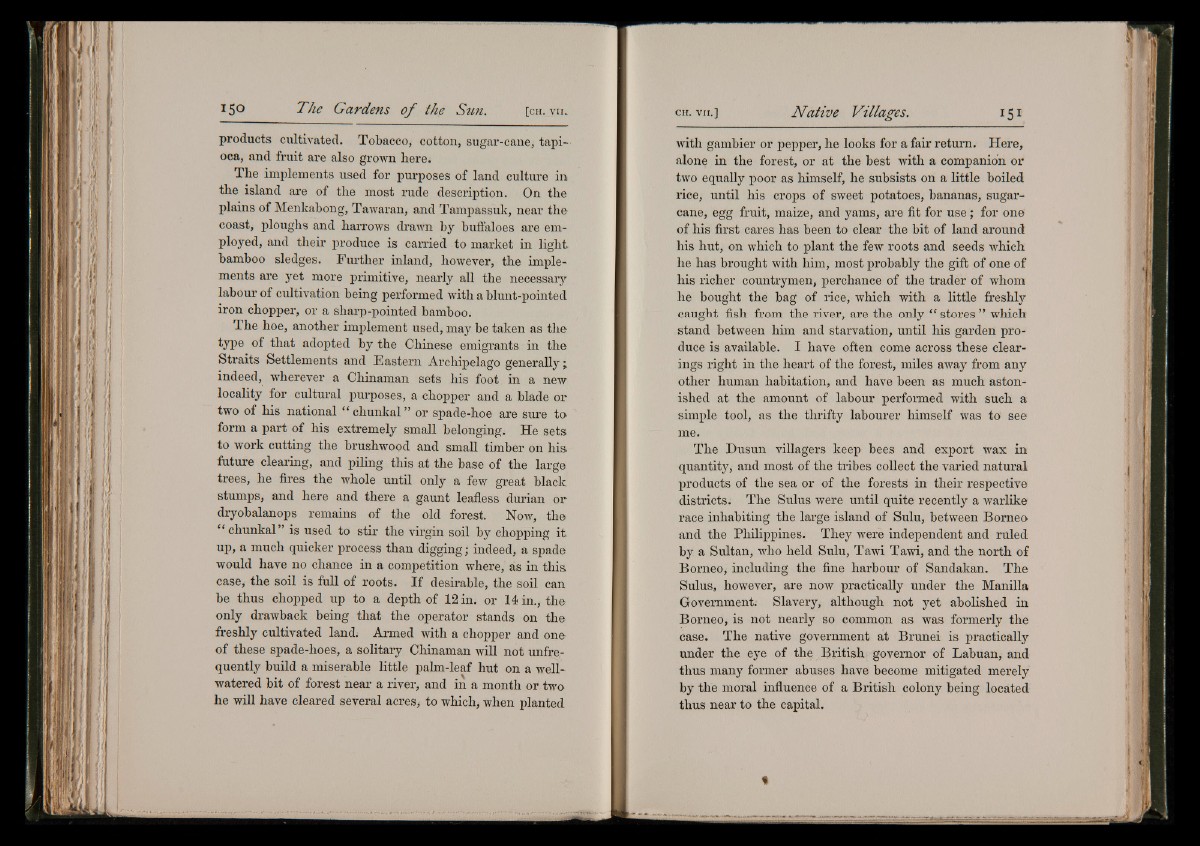
products cultivated. Tobacco, cotton, sugar-cane, tapioca,
and fruit are also grown here.
The implements used for purposes of land culture in
the island are of the most rude description. On the
plains of Menkabong, Tawaran, and Tampassuk, near the
coast, ploughs and harrows drawn by buffaloes are employed,
and their produce is carried to market in light,
bamboo sledges. Further inland, however, the implements
are yet more primitive, nearly all the necessary
labour of cultivation being performed with a blunt-pointed
iron chopper, or a sharp-pointed bamboo.
The hoe, another implement used, may be taken as the
type of that adopted by the Chinese emigrants in the
Straits Settlements and Eastern Archipelago generally j
indeed, wherever a Chinaman sets his foot in a new
locality for cultural purposes, a chopper and a blade or
two of his national “ chunkal ” or spade-hoe are sure to
form a part of his extremely small belonging. He sets
to work cutting the brushwood and small timber on his
future clearing, and piling this at the base of the large
trees, he fires the whole until only a few great black
stumps, and here and there a gaunt leafless durian or
dryobalanops remains of the old forest. Now, the
“ chunkal” is used to stir the virgin soil by chopping it
up, a much quicker process than digging; indeed, a spade
would have no chance in a competition where, as in this
case, the soil is full of roots. I f desirable, the soil can
be thus chopped up to a depth of 12 in. or 14 in., the
only drawback being that the operator stands on the
freshly cultivated land. Armed with a chopper and one
of these spade-hoes, a solitary Chinaman will not unfre-
quently build a miserable little palm-leaf hut on a well-
watered bit of forest near a river, and in a month or two
he will have cleared several acres, to which, when planted
with gambier or pepper, he looks for a fair return. Here,
alone in the forest, or at the best with a companion or
two equally poor as himself, he subsists on a little boiled
rice, until his crops of sweet potatoes, bananas, sugarcane,
egg fruit, maize, and yams, are fit for use; for one
of his first cares has been to clear the bit of land around
his hut, on which to plant the few roots and seeds which
he has brought with him, most probably the gift of one of
his richer countrymen, perchance of the trader of whom
he bought the bag of rice, which with a little freshly
caught fish from the river, are the only “ stores ” which
stand between him and starvation, until his garden produce
is available. I have often come across these clearings
right in the heart of the forest, miles away from any
other human habitation, and have been as much astonished
at the amount of labour performed with such a
simple tool, as the thrifty labourer himself was to see
me.T
he Dusun villagers keep bees and export wax in
quantity, and most of the tribes collect the varied natural
products of the sea or of the forests in their respective
districts. The Sulus were until quite recently a warlike
race inhabiting the large island of Sulu, between Borneo
and the Philippines. They were independent and ruled
by a Sultan, who held Sulu, Tawi Tawi, and the north of
Borneo, including the fine harbour of Sandakan. The
Sulus, however, are now practically under the Manilla
Government. Slavery, although not yet abolished in
Borneo, is not nearly so common as was formerly the
case. The native government at Brunei is practically
under the eye of the British governor of Labuan, and
thus many former abuses have become mitigated merely
by the moral influence of a British colony being located
thus near to the capital.
*